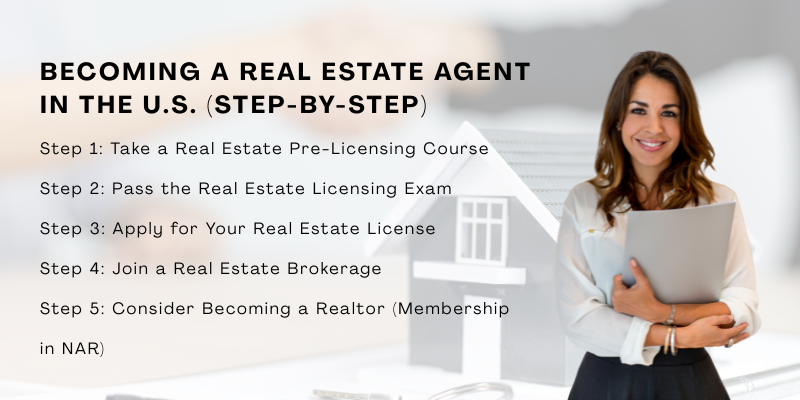A real estate license is required to work as a real estate agent in all 50 US states.
But, how to get a real estate license in USA?
To obtain a real estate license, individuals must meet specific state requirements, which typically include completing pre-licensing education, passing a licensing exam, and submitting an application to the state’s licensing authority.
Each state has its own set of rules, ensuring that only qualified professionals can legally offer real estate services.
To legally practice as a real estate agent or broker, individuals must obtain a license from the state in which they intend to work.
Each state has its own requirements, which typically include completing pre-licensing education, passing an exam, and submitting an application to the state’s licensing authority.
Without a license, individuals are not legally allowed to provide real estate services, which could lead to penalties and legal issues.
A real estate marketing agency may help new agents build their business once they get their license by offering services such as branding, lead generation, and digital strategies.
Explore the basics you need to know about getting your real estate agent license and developing your business.
Licensed Real Estate Agent vs. Broker
A licensed real estate agent and a broker both work in property sales, but they differ in qualifications, responsibilities, and authority.
A licensed real estate agent is typically an entry-level professional who helps clients buy, sell, or rent properties.
Becoming an agent usually requires completing pre-licensing courses and passing a state exam, no college degree is required. However, agents must always work under a licensed broker and cannot operate independently.
A real estate broker, on the other hand, is an agent who has gone through additional education, gained a few years of experience, and passed a more advanced licensing exam.
Brokers can perform the same duties as agents but have the legal authority to work independently, open their own real estate firms, and hire or supervise other agents.
Some brokers also manage rental properties and handle tenant relations, expanding their role beyond sales. Brokers often rely on B2B marketing strategies to grow their business and engage with other industry professionals.
Brokers are often categorized into three main types based on their role within a firm:
- Associate Broker: Works under another broker but doesn’t manage others.
- Managing Broker: Oversees day-to-day operations and supervises agents.
- Principal (or Designated) Broker: Holds the highest responsibility and ensures the firm complies with state real estate laws.
Some brokers also manage rental properties and handle tenant relations, expanding their role beyond sales.
Prerequisites to Become a Real Estate Agent
To become a real estate agent, you must meet certain basic requirements. Although licensing rules differ from state to state, the following qualifications generally apply nationwide, according to the U.S. Bureau of Labor Statistics:
- Minimum Age: Most states require you to be at least 18 years old. However, a few states, such as Alabama, Alaska, and Nebraska, set the minimum age at 19.
- Residency: You must be a U.S. citizen or a legal resident to qualify for a real estate license.
- Education: A high school diploma or its equivalent is required before you can enroll in pre-licensing courses or take the real estate exam.
Explore Our Digital Marketing Services!
Step-by-Step: How to Become a Real Estate Agent in the U.S.
Every U.S. state requires agents to be licensed, but the path to licensure and the specific rules (education, exams, fees) differ from state to state.

To obtain a real estate license in the USA, there are several key steps to follow:
Step 1: Take a Real Estate Pre-Licensing Course
1. State-approved education: Each state mandates a certain number of hours of “prelicensing” (or “qualifying”) real estate education. You must complete these courses from a school or provider that is approved by your state's real estate commission or licensing body.
-
For instance, in New York, aspiring salespersons must first complete 77 hours of approved qualifying education.
-
In Texas, agents must meet a “Sales Apprentice Education (SAE)” requirement involving a set number of course hours.
2. Course topics: These courses usually cover real estate principles and practices, real estate law, contracts, property valuation, finance, ethics, agency relationships, disclosures, and local/state rules. Some agencies also offer additional training on digital transformation, which can help agents stay competitive in an increasingly online world.
3. Cost & format: Depending on the state and provider, courses can cost several hundred dollars; they may be delivered in person or online.
Step 2: Pass the Real Estate Licensing Exam
1. Exam structure: The licensing exam typically has two portions:
-
A national/general real estate principles portion, which is common across states.
-
A state-specific portion that tests knowledge of that state’s real estate laws, regulations, practices, and disclosures.
2. Passing score & fees: Each state sets its own passing score (often around 70-75%). There is usually an exam fee. (These details vary by state.) Some states also require knowledge about short sale in real estate, which is a sale of property for less than the amount owed on the mortgage.
3. Scheduling and rules: You’ll schedule the exam after your prelicensing education is accepted. Some states require you to submit proof of education before you can sit for the exam.
Step 3: Apply for Your Real Estate License & Get Sponsorship by a Broker
(Note: You had “Step 2: Pass the Exam” twice in your list, so I’ve realigned the steps accordingly.)
1. Submit application to state authority: After passing the exam, you file a license application with your state’s real estate commission, board, or Department of State (depending on the state). This usually involves:
-
Filling out an application form
-
Paying a licensing fee
-
Submitting proof of your prelicensing education and exam results
-
Passing a background check (some states require fingerprinting or disclosure of criminal history)
-
Providing identity documents (age, residency, etc.)
2. Broker sponsorship: Many states require that a newly licensed real estate agent must operate under the supervision of a licensed real estate broker. You will need to be affiliated or “sponsored” by a brokerage, which will usually install you into their office and oversee your transactions. (You cannot legally practice alone as a new agent.) A real estate marketing agency could also assist agents in finding the right broker to work with based on their career goals.
3. Activate license: After your application is approved, your license becomes active. At that point, you may legally practice as a real estate agent under your sponsored broker.
Step 4: Join a Real Estate Brokerage
Working under a broker gives you supervision, access to company resources (marketing, listings, offices), mentorship, and legal oversight. Many brokerages are often tied to digital transformation agencies like Centric that offers innovative tools for agents to streamline their work processes.
The broker helps ensure that your real estate transactions comply with state laws and ethical standards.
Many brokerages have arrangements with agents such as commission splits (the agent gives a share of their commission to the brokerage) or desk fees (a fixed monthly payment). These financial arrangements vary widely.
Brokerages are typically members of a local or regional MLS (Multiple Listing Service). This gives you access to a database of property listings you can show, list, market, or search.
Being with a brokerage often grants you MLS access through that broker. (Some MLSs restrict membership to brokers or to realtors who are members of NAR.)
Step 5: Consider Becoming a Realtor (Membership in NAR)
The term “Realtor®” (often capitalized) is a registered collective membership mark owned by the National Association of Realtors (NAR). Only those licensed real estate professionals who join NAR (and their local and state Realtor associations) may use the “Realtor” title.
1. Code of Ethics & standards: By being a Realtor, you agree to abide by NAR’s Code of Ethics, which imposes duties to clients, the public, and other realtors. This can help build credibility and trust with clients.
2. Benefits of membership: Access to additional tools, educational programs, networking opportunities, advocacy, market data, and MLS systems (depending on your local board), among other professional resources.
3. Not mandatory: Joining NAR is voluntary. You can be a licensed agent and never become a Realtor.
Also Read: How to Start a Real Estate Business
Explore Our Real Estate Marketing Agency!
Top 5 Reasons to Become a Real Estate Agent
Choosing a career as a real estate agent offers several appealing advantages.

- Flexible Schedule: Real estate agents have the freedom to set their own hours, making it easier to balance personal commitments and take time off when needed.
- Unlimited Earning Potential: Since income is based on commissions, your earnings directly reflect your effort, skill, and success in closing deals.
- Independence and Choice: You can decide whether to work independently or as part of a brokerage, giving you control over your career path and work environment.
- Networking Opportunities: Working with clients, brokers, and industry professionals allows you to build valuable connections that can lead to referrals and long-term success.
- No College Degree Required: Most states only require a high school diploma or equivalent to start the licensing process, making it a career accessible to many people.
10 Career Options for Real Estate Agents
Working as a real estate agent is just one of many ways to build a successful career in the real estate industry.
If sales aren’t your preferred path or you’re looking to explore other opportunities, there are several related professions to consider:
- Brokerage specializations: Focus on agricultural, commercial, industrial, or residential properties, depending on your expertise and interests.
- Home inspector: Evaluate properties for safety, structural soundness, and compliance with building codes before purchase or sale.
- Developer: Oversee the planning, financing, and construction of new properties or renovation projects.
- Leasing consultant: Help property owners find tenants and manage lease agreements.
- Mortgage broker: Assist clients in finding suitable financing options and navigating the loan approval process.
- Property manager: Handle the day-to-day operations of rental properties, including maintenance, rent collection, and tenant relations.
- Real estate appraiser: Assess property value for sales, taxation, and financing purposes.
- Real estate counselor: Provide expert advice on property investments, market trends, and portfolio strategies.
- Real estate researcher: Analyze market data, trends, and demographics to guide investment and development decisions.
- Urban planner: Work with local governments and developers to design sustainable and functional communities.
Keep in mind that some of these roles may require additional education, certifications, or specialized training.
For example, an appraiser often needs a background in accounting or finance, while those interested in industrial brokerage should understand zoning regulations and land-use laws.
Conclusion
Understanding how to get a real estate license in USA requires following a clear process, completing pre-licensing education, passing the licensing exam, submitting your application, and joining a brokerage to start your career.
Each step is designed to prepare you for the legal, ethical, and practical aspects of working as a licensed real estate professional.
Becoming a real estate agent takes commitment, continuous learning, and consistent effort to build your network and reputation.
By following these steps and staying dedicated, you can establish a rewarding career in real estate and help clients successfully buy, sell, or manage their properties.








